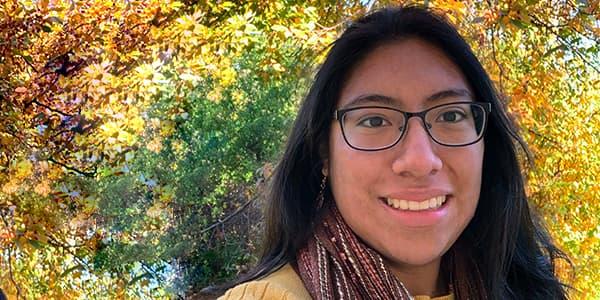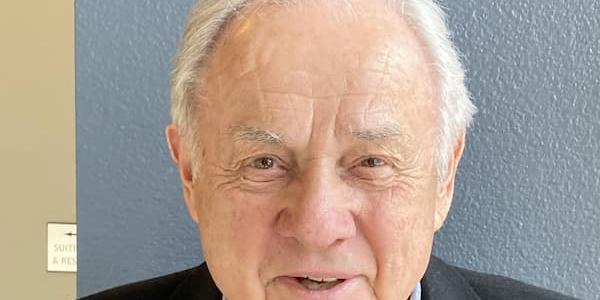Measuring where and how we live.
Interested? Request more information
Credit hours: 120
Full-time, part-time
on-campus with some online courses available
Start terms: fall, spring, summer
Welcome to the Geography and Environmental Sciences Department at the University of Colorado Denver. The university is in the heart of downtown, and our department is more than a collection of classrooms and labs—although we couldn’t be prouder of our state-of-the-art Facility for Advanced Spatial Technology (FAST) or Geospatial Analysis and Mapping (GAM) Labs. The GES program is a passport to understanding the lively tapestry of our shared planet, a hub of academic excellence, and a playground for the curious, adventurous, and environmentally conscious.
Here, you won't be confined to textbooks. Our classroom extends through the city and throughout the epic Rocky Mountain region. Geography is more than maps; it's understanding the dynamic relationships between people and their environments.
Our department is committed to addressing pressing environmental issues of our time. From studying the impact of urbanization on racial inequity to researching sustainable food sourcing, we believe in making a positive impact on the world. That means you get to participate in creating the solutions we need today to protect humanity’s future.
So, if you're ready to embark on a journey that goes outside the boundaries of traditional education, join us in the Geography and Environmental Sciences Department at CU Denver. Let's explore, discover, and make a difference together!
The Geography and Environmental Science department offers 4 options for you to choose from. They are:
Geography
 The Geography gives you the expertise to examine the interconnectedness of people across the globe. This versatile option takes geography beyond the lines on a map, with skill-building tools at the forefront of cutting-edge technology and data analysis. Geography gives you the opportunity any explorer wants: a chance to live the subject, not just learn it.
The Geography gives you the expertise to examine the interconnectedness of people across the globe. This versatile option takes geography beyond the lines on a map, with skill-building tools at the forefront of cutting-edge technology and data analysis. Geography gives you the opportunity any explorer wants: a chance to live the subject, not just learn it.
You’ll explore the world and its people through the lens of how geography cultivates an area’s economics, politics, health, human behavior, religion, ethnicity, and environment.
Geography–Environment, Society, and Sustainability
 Learn the interaction between humans and the environment. Our Geography, Environment, Society, and Sustainability option studies how people have influenced the environment and asks the question, how do we create a world that is sustainable, resilient, and livable?
Learn the interaction between humans and the environment. Our Geography, Environment, Society, and Sustainability option studies how people have influenced the environment and asks the question, how do we create a world that is sustainable, resilient, and livable?
You won’t just acknowledge issues like climate change or other environmental ills, you’ll work with your student and faculty colleagues to search for answers to them.
Geography–Urban Studies and Planning
 The Geography, Urban Studies and Planning option explores the robust relationships between people, places, and their urban environments. With a projection of over two-thirds of the world’s population living in cities in just over 25 years, it’s crucial for future society that we understand and plan the role cities play.
The Geography, Urban Studies and Planning option explores the robust relationships between people, places, and their urban environments. With a projection of over two-thirds of the world’s population living in cities in just over 25 years, it’s crucial for future society that we understand and plan the role cities play.
Where better to not just study, but live and experience this interdisciplinary degree, than in the heart of Colorado’s largest city? You’ll delve into topics spanning from land use, transportation, air quality, environmental justice, to urban sustainability and resilience.
Geography–Environmental Science
 The Geography, Environmental Science option gives you the scientific knowledge of the worlds geography and the Earth's five spheres: the geosphere, hydrosphere, atmosphere, cryosphere, and biosphere. Once you have an understanding of their workings and how they work together you will specialize and be able to tailor your coursework to your individual interests.
The Geography, Environmental Science option gives you the scientific knowledge of the worlds geography and the Earth's five spheres: the geosphere, hydrosphere, atmosphere, cryosphere, and biosphere. Once you have an understanding of their workings and how they work together you will specialize and be able to tailor your coursework to your individual interests.
Your career with a Geology degree
Geography is a growing field
Research different degrees and career trajectories at DataUSA.io
(Screenshot—December 2023)
With our skill-building undergraduate programs and available specializations, you gain the unique combination of technical, analytical, and critical thinking abilities to address the contemporary environmental and societal challenges that impress employers across a variety of industries.
Just a few examples of some of the fields our alumni enter:
The American Association of Geographers offers information on your professional career in geography.
- Education
- Public Policy and law
- Communications
- International Relations
- Preservation
- Conservation
- Social and/or environmental justice
- Non-profit organizations
- Sustainable Resource management
- Sustainable food sourcing
- Advocacy work
- Corporate Sustainability Responsibility Management
- Emergency response and management
- Housing Equity
- Health Equity
- Public Awareness
- Forestry
- City planning
- Transportation Planning
- Urban Policy and law
- Housing Policy and planning
- Urban design
- Air quality management
- Water Quality management
- Environmental Scientist
- Conservation Geographer
- Data analyst
- Climate Change Analyst
A degree from the Geography and Environmental Sciences Department can take you places—literally and figuratively.
Degree Options in Geography and Environmental Sciences
Study Abroad course to Patagonia

The Geography department offers a Study Abroad Winterim course in Patagonia. This is one course of the study abroad options you can take with the Geography department. Read about past trips.
You will choose one of these four degree options.
Geography: 45 Credit Hours
Topics include:
- Physical Geography or Environmental Sciences
- World Regions – Global Context or Human Geography
- Mapping and Map Analysis
- Weather and Climate
- Globalization and Regional Development
Outside of these areas, a Geography BA gives you the most selection in Geography subfield elective classes.
Geography, Urban Studies and Planning core: 39 Core Credit Hours
Topics include:
- Urban Studies and Planning
- Urban Geography: Denver and the US
- Urban Sustainability: Perspectives and Practice
- Urban Analysis
Geography Environment, Society, and Sustainability BA: 39 Core Credit Hours
Topics include:
- The Environment, Society, and Sustainability
- Contemporary Environmental Issues
- Environmental Analysis
- Physical Geography or Environmental Sciences
- World Regions – Global Context or Human Geography
- Mapping and Map Analysis
- Weather and Climate
- Globalization and Regional Development
Geography Environmental Studies: 45 Core Credit Hours
This degree’s course topics differ from the other three BAs to give you more focus on environmental science. Topics include:
- Environmental Studies with Lab
- World Regions–Global Context
- Human Geography
- Physical Geography
- Mapping and Map Analysis
- Weather and Climate
- Earth, Environments, and Human Impacts
- Sustainability in Resource Management
- Geo-Spatial Analysis
- Environmental Science
You will also take courses in Biology or Chemistry related to Environmental Science
CU Denver Core: 34 Core Hours
You’ll be educated in English, math, behavioral and social science, humanities, international perspectives, and cultural diversity.
CLAS Core: 15 Core Hours
These courses give you a better understanding of the issues and skills you need to succeed. CLAS Course topics include:
- Writing in the Sciences
- Second-Language Electives
- Contemporary Issues in the Humanities
- Psychology or Anthropology
- Sociology or Economics
Electives and/or foreign language proficiency
You may also need to take coursework in a foreign language offered through Modern Languages. Talk to your advisor for details, especially if you’ve taken foreign language courses or have experience in a foreign language in your past.
Geography BA Program Learning Goals and Associated CLAS Essential Learning Outcomes (ELOs)
-
Compare the major concepts, theoretical and spatial perspectives, and historical trends in Geography.
- Explain the distinctive physical characteristics of places and regions in terms of geomorphological, hydrological, climatological, and biogeographical processes.
- Explain the distinctive human and cultural characteristics of places and regions in terms of social, cultural, economic, and political processes.
- Analyze, and interpret interconnections between human activities and the natural and built environment at different geographical and temporal scales.
- Evaluate the sustainability and resilience of human-environment systems in the past, present, and future
Associated with ELO I: Knowledge of Human Cultures & the Physical and Natural World
Through study in the sciences and mathematics, social sciences, humanities, histories, languages, and the arts
- Apply geospatial science & technologies.
- Apply qualitative and/or quantitative geographic analytical methods (eg laboratory, field, and computational).
- Communicate complex geographical information through writing, graphics, presentations, animations, and mapping.
- Analyze, and interpret complex problems in research and practice using critical inquiry, systems thinking, synthesis, and interdisciplinary approaches to solve complex problems in research and practice.
Associated with ELO II: Intellectual & Practical Skills (6 of 10)
YES: Inquiry and analysis, Written communication, Oral communication, Quantitative literacy, Information literacy, problem solving
NO: Reading ability, Creative thinking, teamwork
Associated with ELO II: Intellectual & Practical Skills (1of 10)
Critical thinking
- Deconstruct evolving and interconnected social, cultural, economic, and political relationships at the global scale.
- Draw on diverse perspectives to examine complex social and environmental issues and practice global citizenship.
Associated with ELO III: Personal & Social Responsibility (2 of 4)
YES: Intercultural knowledge and competence, Civic knowledge and engagement—local and global
NO: Ethical reasoning and action, foundations and skills for lifelong learning
- Understand key geographical concepts, their multidisciplinary nature, and apply to the real-world.
- Participate in best practices for engagement with local, regional, and/or global communities.
Associated with ELO IV: Integrative & Applied Learning (1 of 1)
Synthesis and advanced accomplishment across general and specialized studies
Honors
- The criteria for cum laude shall be a GPA of 3.6 in all CU Denver courses (a minimum of 30 credits for transfer students) and an honors thesis that demonstrates independent research skills. The criteria for magna cum laude shall be a GPA of 3.75 in all CU Denver courses and a superior honors thesis.
- The criteria for summa cum laude shall be a GPA of 3.9 in all CU Denver courses and a truly exceptional honors thesis. The GPA alone shall serve only as a minimum criterion for each of the three levels of honors. Evaluation of the honors thesis shall be the deciding criterion for the level that is granted.
- The department expects that the award of summa cum laude would be a rare occurrence reserved for students who demonstrate extraordinary academic promise. Admission to the honors program and the awarding of departmental honors shall be subject to faculty approval.
Geography and Environmental Sciences (GES) Minors
If your degree is not in GES, you can add a GES minor to your degree in as little as 15 to 17 credit hours. Our minors are:
- Geography Minor–15 Credit Hours, Available Online or On-Campus
- Environmental Science Minor–17 Credit Hours, Available On-Campus
- Urban Studies and Planning Minor–15 Credit Hours, Available On-Campus
Double Majors
Adding a second major to your Geography and Environmental Sciences degree enhances your skillset, creates a versatile portfolio of skills for a broader range of careers. Geography and Environmental Sciences brings insights from multiple perspectives that prepares you for careers and shows you have the flexibility to adapt in a changing landscape.
Some of our most common double majors include:
- Political Science an especially strong combination if you want to focus on environmental and/or geographical change in law or public policy
- International Studies gives you a broader global perspective
- Public Health is excellent to help you understand and make a difference in the converging worlds of location and health
- History helps you deepen your understanding of history, urbanism, geography, preservation, and the environment
Certificates
Add a certificate to your degree.
Sustainable Urban Agriculture Certificate: 12 Credit Hours
This certificate provides GES students advanced training in sustainable urban agriculture through the integration of a field-based practicum conducted at the department’s field research station and university classroom study (mostly online). This certificate is available to GES students.
Learn more about the Sustainable Urban Agriculture certificate
Free and Open Source Software for Geospatial Applications (FOSS4G): 12 Credit Hours
Opensource geospatial apps have changed how we utilize and visualize data. This certificate will give you practical skills in planning and building these databases and will help you learn how to use the output to reveal geospatial information in new ways. This certificate is available to both students and professionals.
Learn more about the FOSS4G certificate.
Geographic Information Science (GIS) Certificate: 18 credit hours
Become proficient in GIS and Technology. Place-based technologies permeate our lives, from the location services on our Smartphones to the spatial-decision support systems that guide application in areas such as disaster management, health care and public health, digital humanities, infrastructure support and management, resource and water management, urban and regional planning, sustainability, and business analytics.
This certificate develops proficiency in applying spatial thinking, GIS, and geo-technologies. This certificate is available to undergraduate, graduate, and non-degree seeking students.
The cost of tuition for the BA/BS in Psychology is different for in-state and out-of-state students. See the link for the current table of rates.
Residents of Western Interstate Commission for Higher Education (WICHE) states may qualify for reduced tuition rates. The Western Undergraduate Exchange (WUE) program requires students to maintain current residency in WICHE state until degree completion.
Scholarships
Each year, CU Denver undergraduate students are awarded over $30 million in scholarships from institutional, local, state, and national sources. Learn more, and apply here.
Rodgers Scholarship
Visit the Rodgers Scholarships page to learn about application requirements
Other opportunities
Many departments and offices at CU Denver offer student employment (including work-study, student hourly positions) through LynxConnect. Learn more here.
Admission Requirements
If you are an incoming freshman to CU Denver (in-state, out-of-state, and international applicants), you can apply through either the Common Application or the Milo Application. Transfer students will need to submit the Milo Application.
Incoming first-year students
CU Denver requires that students complete the Colorado Higher Education Admission Requirements (HEAR). You will not have to meet all Minimum Academic Preparation Standards (MAPS) for admission, but you will need to complete CU Denver coursework by graduation.
Transfer Students
We have strong connections with other four-year and community colleges. If you have completed more than 24 credits of transferable coursework, you will be evaluated for admission on the basis of your college GPA without regard to your high school performance. If you have fewer than 24 credits, you will be evaluated based on both your high school and college GPAs. For more information and to plan your transfer, see transfer admissions in the admissions office.
If you are in your first or second semester at one of the participating Colorado community colleges and plan to transfer to CU Denver after earning your associate degree, CU Denver Bridge to Bachelors might be a great program for you. To qualify, you must meet the criteria including meeting regularly with your assigned CU transfer advisor while you are attending community college.
International Students
You will need to begin your application through the Office of International Affairs. They will help you manage your application process.
Spring
Domestic Application: January 1
International Applications: Priority is September 15, and Final is October 15
Summer
Domestic Applications: May 15
International Applications: Priority is January 15, and
Final is March 15
Fall
Domestic Applications: August 1
International Applications: Priority is March 15, and
Final is May 15
Geography and Environmental Science In the news
In the news
- Breaking New Ground: CU Denver PhD Student Maps the Real Impact of Heat on Denver’s Health
- Rudi Hartmann, Author of Tourism, Memorials and Landscapes of Violence: Remembering the Holocaust and Pacific War, Rudi Hartmann, to Meet Critics
- Rudi Hartmann publishes new book about memorials of the Holocaust and the Pacific War

Making Education Work for All
At CU Denver, making education work for all means breaking down barriers so every learner can succeed. Through inclusive policies, programs, and partnerships, we’re building a culture where opportunity isn’t defined by identity but by ambition and impact. Learn more at our Office of Access and Campus Engagement (ACE)

Find your place
Whether it’s in a classroom, through an assignment, in a club, or in a lab, you’re sure to find a like-minded network here in the GES Department!
- Apply to be an editor or submit your own work for our peer-reviewed student journal, Confluence
- Join our chapter of Gamma Theta Upsilon, where you’ll network with the next generation of leaders in geography
- Every Day Geographical Experiences (EDGE) Student Club
- Facility for Advanced Spatial Technology [FAST] Lab
- Geospatial Analysis and Mapping [GAM) Lab

1st generation student finds her place
As a first-generation university student, I am deeply aware and intentional about where and how I invest my resources. Geography is valuable because it gives me tools to learn more about the world’s social and physical elements with special, exciting angles leading to a fuller, multifaceted understanding. I received genuine, effective support throughout the department allowing me to succeed and strengthen my abilities. This has made me prepared and eager to meet new experiences and opportunities I never thought possible.
—Annalisa Hamm



